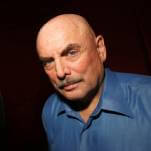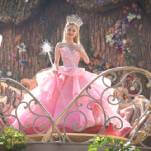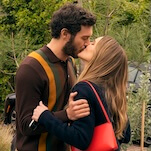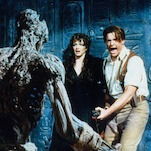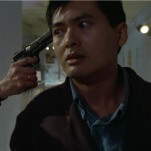In classic boring-commentary form, Fickman obsesses about technical details; audiences could be excused for thinking that a director’s job mostly involves choreographing an intricate dance between unpredictable weather conditions and various sets. Fickman is so unrelentingly dull that at one point Crystal teases him for imagining that home audiences could possibly care that a soccer scene was designed as a deliberate homage to a similar scene in Fickman’s own She’s The Man. A clearly bored and disinterested Crystal passes the time with an endless series of dad jokes. For instance, when Fickman points out that a supporting player appears on The Walking Dead, Crystal jokes, “The walking dead were actually the Yankees in the playoffs,” and a scene set at the Roswell County Club inspires the geriatric funnyman to quip that that’s where all the alien bodies are hidden.
Fickman alternates between boring production details (when he begins a statement with “interestingly” it’s safe to assume that what he has nothing of interest to say) and sweaty, awkward attempts to match Crystal quip for quip. Fickman actually ends up doing much of the talking, more out of a need to fill dead air than out of a genuine desire to elucidate the making of Parental Guidance. As a man with stints as both a jester at a renaissance fair and a vice president of development for Bette Midler’s production company, Fickman has an interesting background, but that sure does not make for an interesting commentary.
What went wrong: Aside from Fickman tragically never getting to make full use of a gorgeous patio because of the terrible weather? Crystal mentions that the germ of the idea for the film came to him six years ago when he babysat his grandchildren and thought, “Eh, maybe there’s a movie in this or something,” and brought in the actor who played his grandson to read for studio executives two years ago. He goes on to mention that he and the actor who played his grandson were the only actors to survive the original incarnation of the movie, which invites the question: What happened to the rest of the cast? Did Crystal have them ritually sacrificed to his god, Phil Rizzuto? How did this earlier incarnation of Parental Guidance fall apart? Alas, those are all secrets Fickman and Crystal will take to the grave in order to make space for more commentary about that gorgeous patio they never got to exploit to its true and full potential.
Comments on the cast: Everybody in the cast is singled out as fantastic and wonderful and a joy to work with, particularly the Divine Miss M, Bette Midler, whom Crystal calls a “storm front of the highest order” and one of our nation’s greatest musical treasures. He’s similarly impressed with the child actors and their ability to memorize great blocks of dialogue, in addition to using Twitter and various handheld electronic devices.
Crystal accidentally highlights Hollywood’s ridiculous double standards when he mentions that Marisa Tomei, who plays his daughter in this movie, actually read to play his wife in Mr. Saturday Night many years back and was deemed just a little too young. Crystal later jokes that Tomei looks like she could be his girlfriend, which prompts Fickman to joke that that’s the film’s secret subtext, which suggests an altogether darker, weirder, and more interesting film than the one they made. Crystal also hails Tomei as “a very available actress always in search of the truth of the moment.” So, you know, she has that going for her.
Crystal also has very kind words for the actress who plays a teacher with progressive ways, who just so happens to be his daughter, though he states firmly that she had to earn the role with a dynamite audition, not just by virtue of beginning life inside the testicles of the producer/star. Fickman, meanwhile, hails Tom Everett Scott, who plays Tomei’s husband, as a “good-natured guy to have on set,” which is the audio-commentary equivalent of saying that a homely girl has a dynamite personality.
Inevitable dash of pretension: Crystal says that for his character, baseball “is a metaphor for life.” You know what else is a metaphor for life? Chess. Why doesn’t that ever come up in movies?
Commentary in a nutshell: Crystal immediately establishes the cornball tone for the commentary when he jokes, “Here is my first comment. Why is it not 21st Century Fox? Am I right? It should be 21st Century Fox to show they’re on the cutting edge.”
